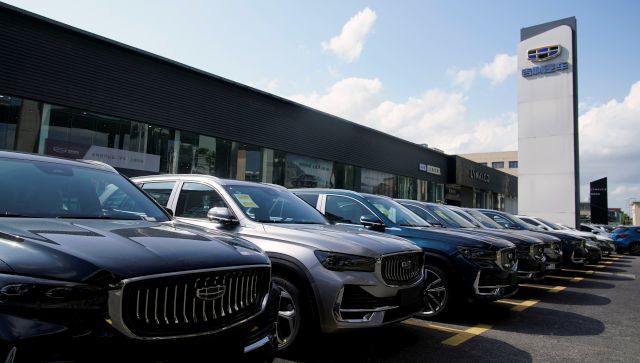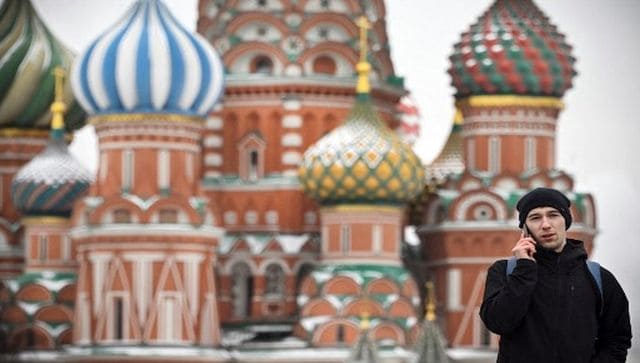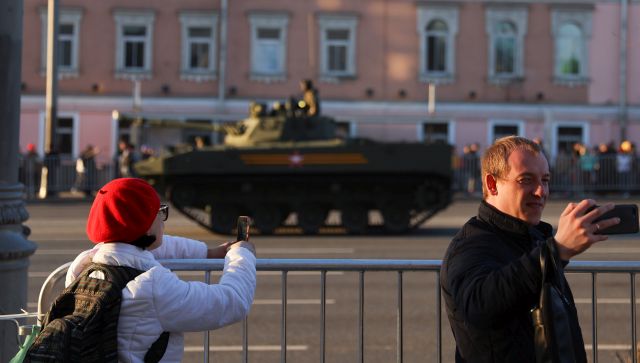China and Russia are closer than you think. While Beijing has claimed
“neutrality” in the Ukraine war it has continued to favour the Kremlin. And its impact on Russia’s war-hit economy is for all to see. As the West slapped the country with
sanctions over the
Ukraine invasion and global manufacturers pulled out, Russia needed an alternative. They needed everything from phones to cars. This is where China stepped it. Today’s Russia is different. Its people are forced to
make new choices – they have fewer options but they might not be necessarily feeling the pinch.
Apple’s iPhones and Samsung’s Galaxies were favourites but after the electronic giants left the Russian market a year ago, the popularity of Chinese phones soared. Handsets by Chinese manufacturers Xiaomi and Realme now top the sales charts, according to Counterpoint, a global technology market research firm, reports CNN. Also read: One Year of Russia-Ukraine War: Will the conflict end in 2023? Chinese phones are ringing across Russia Chinese phones had a presence in the country before the conflict and accounted for nearly 40 per cent of the smartphone market in December 2021. Now they dominate it with 95 per cent of the market share, Counterpoint data reveals. Samsung and Apple enjoyed 53 per cent of the market share together. They are reduced to a mere three per cent over the same period, the report says. Xiaomi, Realme and Honor, the budget brand formerly owned by Chinese tech giant Huawei, “reacted quickly to grab the opportunity,” Jan Stryjak, an associate director of Counterpoint told CNN. Their shipments to Russia went up by 39 per cent, 190 per cent and 24 per cent respectively in the third quarter of 2022, compared to the previous quarter, the publication reports. [caption id=“attachment_12235782” align=“alignnone” width=“640”] Before the war, iPhone was a favourite among Russians who could afford them. File photo/Reuters[/caption] A similar impact is seen in the market share of other electronic goods. Huawei became Russia’s second-largest seller of notebook computers last year by market share, up from the eighth place in 2021. HP dropped from the No 1 spot to fourth place in 2022, according to a report by Nikkei Asia. Also read: Ukraine’s Volodymyr Zelenskyy to meet Xi Jinping after China proposes peace plan: What is Beijing’s 12-point proposal? Racing ahead in Russia If Chinese phones and electronics have invaded homes, cars have taken over roads. Carmakers including Geely Automobile Holdings Ltd, minivan maker Chery Automobile Co and Great Wall Motor Co, which is known for its affordable Haval brand have raced ahead in the Russian auto market as global manufacturers like Volkswagen, Mercedes Benz Group and Toyota Motor exited the market. The three big groups recorded combined sales of 16.5 per cent of new passenger cars and small commercial vehicles for 2022. This was a rise from 6.3 per cent the year before, the Association of European Businesses reports. According to the data provider Autostat, Russians purchased a record number of Chinese cars in 2022. The sales of new Chinese vehicles rose in the country by seven per cent last year, even as the market crashed, reports CNN. [caption id=“attachment_12235752” align=“alignnone” width=“640”]
Graphic: Pranay Bhardwaj[/caption] “There is little production of Western car brands and few imports, so the market is divided between the Russian and Chinese car industries,” Russian automotive analyst Vladimir Bespalov told Reuters. Russian cars satisfy demand at lower prices up to about 1.5 million roubles ($23,961), and the Chinese are taking over the Western niche of prices above 2.5 million roubles. Renault, Hyundai and Kia were the big players in the Russian market and they exited because of the invasion. “It left a huge hole in the market. And the Chinese are glad to fill that hole,” said Tu Le, founder of Beijing-based consulting firm Sino Auto Insights told CNN. Also read: Russia-Ukraine conflict: From Apple to Amex, the exodus of Western brands from Moscow Advantage China Renault was reluctant to pull out. But it was forced to suspend operations in Russia after it drew the ire of Ukrainian president Volodymyr Zelenskyy, who called on the automaker and other French companies to “stop being sponsors of Russia’s war machine”. Renault gave up on its second-biggest market, writing off $2.4 billion of assets, reports Bloomberg. [caption id=“attachment_12235792” align=“alignnone” width=“640”]
Russia was Renault’s second-largest market but the French automaker was forced to exit after outrage over the Ukraine war mounted. AFP[/caption] Several other multinationals like Marks and Spencer, Mariott, and Japna’s Fast Selling Co had to shut businesses amid fears of boycott as outrage over the war grew. Amid all this, Chinese brands continued their business and only profited. Unlike the West, they face no threat of a consumer backlash back home, the report says. Danger ahead? But there is a flipside as some of the big Chinese automakers eye the West, hoping to make a foray into Europe and the United States. According to the Bloomberg report, Geeley and its founder Li Shufu control Swedish automakers including Volvo Car AB and Polestar Automotive Holding. Geely and Volvo’s Lynk & Co brand offers monthly car rentals in cities including Berlin, Barcelona and Milan, and Geely’s Zeekr marque is collaborating with Google’s self-driving company Waymo. [caption id=“attachment_12235832” align=“alignnone” width=“640”]
 China’s Geely Automobile, which has a presence in Russia, also has business interests in Europe. Reuters[/caption] Chinese auto giants then have a lot at stake. In Europe, there is little tolerance toward the war with many countries on the side of Ukraine. China’s Chery, Great Wall and Geely have been able to “fly under the radar” because they’re not well known in Europe or the US, Marina Rudyak, an assistant professor for Chinese Studies at Germany’s Heidelberg University told Bloomberg, adding that they should not underestimate the support Europeans have for Ukraine. Russia’s plight While popular smartphone and car brands no longer have a presence in Russia, some people can still get hold of them. In March, Russia announced the parallel import scheme which authorised retailers to import products from abroad without the trademark owner’s permission. The policy covers products ranging from luxury clothes to cars. Backdoor imports allow Russians to get hold of Apple and Samsung products but they are priced higher. [caption id=“attachment_12235882” align=“alignnone” width=“640”]
China’s Geely Automobile, which has a presence in Russia, also has business interests in Europe. Reuters[/caption] Chinese auto giants then have a lot at stake. In Europe, there is little tolerance toward the war with many countries on the side of Ukraine. China’s Chery, Great Wall and Geely have been able to “fly under the radar” because they’re not well known in Europe or the US, Marina Rudyak, an assistant professor for Chinese Studies at Germany’s Heidelberg University told Bloomberg, adding that they should not underestimate the support Europeans have for Ukraine. Russia’s plight While popular smartphone and car brands no longer have a presence in Russia, some people can still get hold of them. In March, Russia announced the parallel import scheme which authorised retailers to import products from abroad without the trademark owner’s permission. The policy covers products ranging from luxury clothes to cars. Backdoor imports allow Russians to get hold of Apple and Samsung products but they are priced higher. [caption id=“attachment_12235882” align=“alignnone” width=“640”] While Russians have access to Chinese brands, many feel the void left by the big manufacturers. AFP[/caption] Counterpoint analyst Harshit Rastogi wrote in a blog post about the problems Russian users face with these high-end imports. They could have trouble downloading apps that are blocked in the country and service from official providers is not guaranteed, he wrote, according to CNN. People who buy cars through parallel imports also face similar trouble with no access to warranties. But some Russians are still purchasing Audis and Mercedes from Kazakhstan or Uzbekistan. However, it’s the Chinese and local Russian brands that are benefitting. But has the market changed forever? That will be seen only
if and when the war ends and international brands make a re-entry. With inputs from agencies Read all the Latest News , Trending News ,
Cricket News , Bollywood News , India News and Entertainment News here. Follow us on
Facebook,
Twitter and
Instagram.
While Russians have access to Chinese brands, many feel the void left by the big manufacturers. AFP[/caption] Counterpoint analyst Harshit Rastogi wrote in a blog post about the problems Russian users face with these high-end imports. They could have trouble downloading apps that are blocked in the country and service from official providers is not guaranteed, he wrote, according to CNN. People who buy cars through parallel imports also face similar trouble with no access to warranties. But some Russians are still purchasing Audis and Mercedes from Kazakhstan or Uzbekistan. However, it’s the Chinese and local Russian brands that are benefitting. But has the market changed forever? That will be seen only
if and when the war ends and international brands make a re-entry. With inputs from agencies Read all the Latest News , Trending News ,
Cricket News , Bollywood News , India News and Entertainment News here. Follow us on
Facebook,
Twitter and
Instagram.
The Ukraine invasion saw an exodus of global brands from Russia. Beijing noticed and decided to take advantage. A year on, Xiaomi and other Chinese smartphones enjoy 95 per cent of the market share. Chinese cars are also racing ahead in the country crippled by sanctions
Advertisement
End of Article


)

)
)
)
)
)
)
)
)



